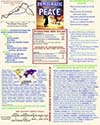[First published April 5, 2005] I have put on my website Frank H. Denton’s book, Knowing the Roots of War: Analyses and Interpretations Of Six Centuries Of Warfare. It is unavailable elsewhere. Well experienced and knowledgeable to write a book on war, Frank Denton has had a career of 50 years in defense and foreign affairs. After a time with the defense industry, he joined RAND and the foreign service. He served in Afghanistan, Egypt, Jordan, Malaysia, Philippines, and Washington, and has retired to do research in the Philippines. He has published extensively in several different fields, but concentrated on patterns and trends in the political use of warfare. After undergraduate work in statistics and math, he obtained a PhD in International Relations from the University of Southern California.
Denton’s statistics and insights into war are useful and interesting for both the student of warfare and international relations, and those with a moral or historical interest.
He says:
While I am not in any sense someone who might be classified as a pacifist, the fundamental conclusion that is inescapable is that quite in antithesis to the Clausewitzian model of the employment of warfare to manage conflicts, warfare has demonstrably been used, if you will, to mismanage conflicts. Society has need of and opportunity to seek means for better controlling the use of warfare for the practice of initiating warfare is inordinately costly in lives, disruptions and treasure and is shown here to be frequently a failure. It is my observation that this presentation of results provides some background that can lead to better control of warfare. Just as importantly, it opens a wide range of ideas and hypotheses for further investigation.
His overall evaluation is this.
Across all time periods, in all types of governments, for any power relationships other than big/small, the party making the decision to go to war, that is firing the first shot in a war, has for two hundred years had less than a fifty-fifty success rate, often much less, in achieving its objectives in firing that first shot. Time-after-time, year-after-year, conflict after conflict, political leaders took decisions to initiate wars in which they failed to achieve their objectives. Based on a listing of 500 incidents of warfare that took place in a two-century interval this provides a hard to dispute validation of Barbara Tuchman’s statement in the first paragraphs of The March of Folly.
A phenomenon noticeable throughout history regardless of place or period is the pursuit by governments of policies contrary to their own interests. Mankind, it seems, makes a poorer performance of government than of almost any other human activity. In this sphere, wisdom…is less operative and more frustrated than it should be. Why do holders of high office so often act contrary to the way reason points and enlightened self-interest suggests? Why does intelligent mental process seem so often not to function?
Why did successive ministries of George III insist on coercing rather than conciliating the American colonies though repeatedly advised by many counselors that the harm done must be greater than any possible gain? Why did Charles XII and Napoleon and successively Hitler invade Russia despite the disasters incurred by each predecessor?
Former Secretary of Defense, Robert McNamara makes a saddened assertion in his memoirs of the Vietnam War build-up that is strangely similar to Tuchman’s:
Readers must wonder by now…how presumably intelligent, hardworking and experienced officials-both civilian and military-failed to address systematically and thoroughly questions whose answers so deeply affected the lives of our citizens and the welfare of our nation.
There is perhaps no better way of stating the results found here than to assert that Folly Marches Onward.
By his statistics, this is true across all types of governments, except when one focuses on democracy. Not only do they not make war on each other, as I have found (this is outside of Denton’s data, which focused on a nation’s war and not on the type of government of those who fought each other), but as he shows (search for the keyword “democracy”), in the 19th Century democracies won 76 percent of the wars they fought, while monarchies won 43 and dictators 42 percent. In the 20th Century, the percentages are respectively, 54, 37, and 33.
So, democracies have the best fighting machine, if they have to go to war against the thugs of this world or are attacked.
Link of Note
”The Berger wrist slap: A dangerous precedent” (4/5/2005)
By David Limbaugh
Limbaugh notes:
[Sandy] Berger, a national security adviser in the Clinton administration, was caught red-handed removing sensitive, classified documents from the National Archives. He wasn’t doing something as innocuous as research for his personal memoirs. No, he was preparing for testimony before the 9-11 commission to vindicate Bill Clinton’s performance in response to the terrorist threat. The documents he secreted, purloined and later deliberately destroyed, were exceedingly relevant to the subject matter of his 9-11 testimony. . . . Under a plea agreement with the government, Berger will be fined $10,000 and his national security clearance will be suspended for three years.
Note that at first Berger said that he took the documents unintentionally — his destruction of them was accidental or inadvertent. Now, he admits to the court he did it all intentionally.
Note also that for lying to investigators, Martha Stewart got five months in jail and two years probation. She destroyed no documents.
President Clinton was found by a court to have lied before a grand jury and to have lied under oath in a civil deposition. He eventually admitted wrongdoing, was fined $25,000, and barred from law practice for 5 years.
Why did Stewart get jail time when Berger and Clinton served no jail time for far more serious crimes?



 Posted by rudyrummel
Posted by rudyrummel 






